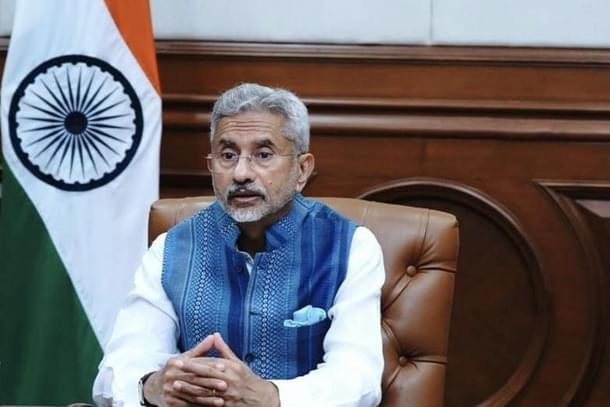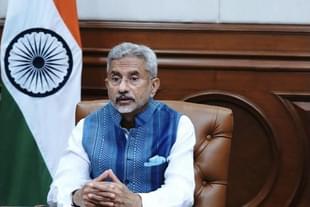News Brief
Munich Security Conference: Where S Jaishankar Described China's Debt Trap Diplomacy Without Naming It
Swarajya Staff
Feb 21, 2022, 01:33 PM | Updated 01:33 PM IST
Save & read from anywhere!
Bookmark stories for easy access on any device or the Swarajya app.


In an exchange at the Munich Security Conference on Saturday (19 February), External Affairs Minister (EAM) S Jaishankar said that countries seeking loans should worry about unsustainable infrastructure projects such as airports and ports that are empty.
The comment hinted at China's debt trap diplomacy and came in response to Bangladesh Foreign Minister AK Abdul Momen, who questioned whether the Quad could provide the financial assistance that China does.
Momen was in the audience of the panel discussion where EAM Jaishankar shared the stage with a senior United States Senator Jeanne Shaheen, and the foreign ministers of France, Australia and Japan.
Momen said while India had offered Lines of Credit and Japan had also helped with infrastructure financing, the incoming loans had been “declining”, and it was China that had “come forward with a basket of money and aggressive, affordable proposals”. He said that it was hard to decide what to do, given that with the development in Bangladesh, people were demanding more infrastructure.
“We need more funding from our development partners, and that unfortunately comes with lot of strings attached and that becomes very difficult. Today, our largest loans are from the World Bank and the IMF and the ADB, but also, we are trying to get some funding from others. Is there an easy way out,” Momen asked the panel.
Jaishankar was quoted as saying by The Hindu: “We have seen now countries, including in our region [Indian subcontinent], being saddled with large debts. We have seen projects which are commercially unsustainable: airports where an aircraft doesn’t come, harbours where a ship doesn’t come.” He was talking about the future of the Indo-Pacific, in comments seemingly referencing the example of Sri Lanka.
Sri Lanka took loans from China to build the Hambantota port and the Mattala airport, which the island nation struggled to pay back. Sri Lanka was eventually forced to hand over the port on a 99-year lease to a Chinese company, in an eerie similarity with the agreements carried out by European colonising nations in the 19th century.
“It [avoiding unsustainable projects] is obviously in the interest of the consumer country concerned, but it’s also in the interest of the international community because unsustainable projects don’t end there. Often the next is, debt becomes equity, and that becomes something else,” Jaishankar said, further explaining the problem countries like Sri Lanka faced.
When asked about India’s ties with China, Jaishankar said that the India-China relations were going through a “difficult phase” and the state of the relationship stemmed from “the state of the border” and China’s transgressions along the Line of Actual Control since April 2020.
China's neocolonialism and debt-trap
Brahma Chellaney points out that China often begins as an economic partner of a small, financially weak country, only to gradually become its economic master. He lists the following characteristics of such agreements:
China doesn't provide aid or low-interest lending but market-rate infrastructure finance
The agreements include a confidentiality clause which prevents inquiry into terms by national as well as international bodies
They often include excessive provisions, for example, the loan repayment schedule can be accelerated by China; the receiver country is barred from the option of multilateral restructuring
China deliberately chooses financially non-viable projects and weak countries to increase its leverage
Once the country starts failing to repay the loan, China offers relaxation in return of the control of strategic assets like Badakhshan port in Tajikistan; Hambantota in Sri Lanka; Gwadar in Pakistan; National Grid in Laos; islets from Maldives, Solomon Islands, etc.
Chellaney says that China is inspired by the European colonial expansion. "The concept of a 99-year lease, ironically, emerged from the flurry of European colonial expansion in China in the 19th century," he writes.
Other countries are also perturbed by Chinese 'hub-and-spoke' model of connectivity through infrastructure instead of connectivity through fair agreements. In the former, China remains at the centre and unilaterally controls the development. In the latter, countries respect each other's sovereignty, negotiate and enter into fair deals to enhance connectivity. This system stands on the bedrock of multilateral rules-based order and mutual respect and benefit.
In terms of infrastructure development and connectivity, initiatives like Asia Africa Growth Corridor (India and Japan); Blue Dot Network (US, Australia, Japan); Global Gateway (European Union), etc. are seen as a counter to China's Belt and Road Initiative. However, they lack the strategic depth and integrated approach required to counter the Chinese machinations.





